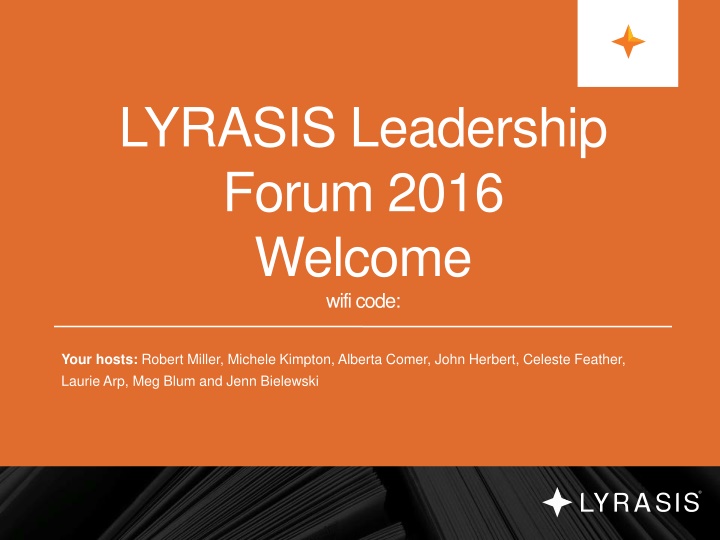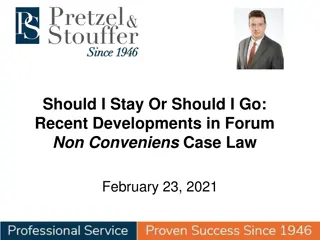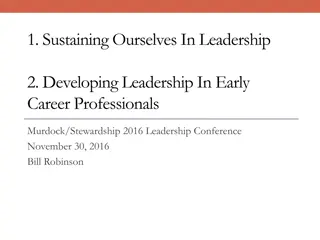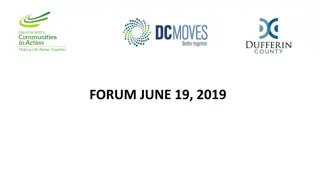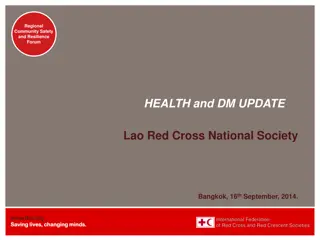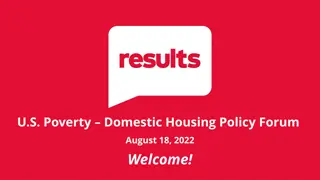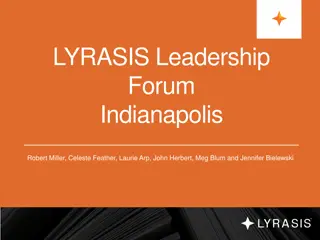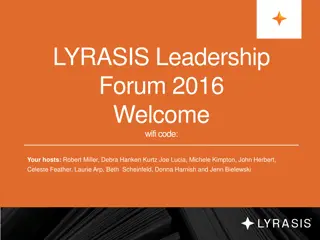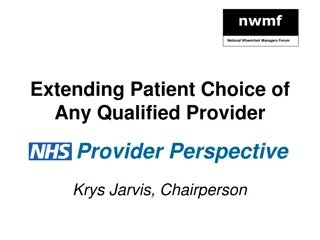Insights from LYRASIS Leadership Forum 2016
Delve into discussions from the LYRASIS Leadership Forum 2016 covering topics such as content creation, open access, library roles, commercial content hosting, and open source software trends. Key questions raised include shifts in organizational priorities, support for open access content, interdepartmental collaborations, and motivations for exploring new content models. Explore the evolving landscape of information management and collaboration within the information industry.
Download Presentation

Please find below an Image/Link to download the presentation.
The content on the website is provided AS IS for your information and personal use only. It may not be sold, licensed, or shared on other websites without obtaining consent from the author.If you encounter any issues during the download, it is possible that the publisher has removed the file from their server.
You are allowed to download the files provided on this website for personal or commercial use, subject to the condition that they are used lawfully. All files are the property of their respective owners.
The content on the website is provided AS IS for your information and personal use only. It may not be sold, licensed, or shared on other websites without obtaining consent from the author.
E N D
Presentation Transcript
LYRASIS Leadership Forum 2016 Welcome wificode: Your hosts: Robert Miller, Michele Kimpton, Alberta Comer, John Herbert, Celeste Feather, Laurie Arp, Meg Blum and Jenn Bielewski
eResources & Licensing Celeste Feather Licensing and Strategic Partnerships
LYRASIS Licensing and Strategic Partnerships Staffed by a team of 4 librarians Rooted in work of legacy networks Includes collaborative programs at national level lyrasis.org
Material People Contribute to the Online World Structured TEDx Licensed content Wikimedia Scholarly Open Access content Kudos Non-traditional Traditional YouTube Local/archival collections and repositories Digital humanities Open data Unstructured lyrasis.org
Questions Do you see the emphasis changing from content acquisition to content creation within your organization? Given stagnant budgets, what activities are no longer being performed so that efforts may be directed elsewhere? What level of priority does your organization give to the creation and support of openly accessible content? And for what types of content and for whom? What role should or does your library play in bringing together multiple departments to review new services that impact the entire organization? What role should LYRASIS play in expanding awareness of these services, and how can we assist members in this area? What new models for hosting and accessing commercial content are being explored within your organization? What is the leading motivator, a desire for control or dissatisfaction with what commercial providers have developed so far? lyrasis.org
Open Source Community Supported Software Michele Kimpton, former CEO DuraSpace
Open Source Software Trends Continued adoption and growth in academic and government Apache Web Server, Drupal Improved technical infrastructure for distributed development github, SLAC, Jira, Agile development process Improved Interoperability- API s Emerging vendor ecosystem lyrasis.org
CSS Matrix Open Source Pros Cons For and by community; designed to meet needs Ownership and control Potential learning curve Continues to grow to meet community s needs Confused users Collaboration Collaboration Free Free like kittens Open source: hands on exploration Potential for orphan software Community Documentation/Support/Training vary Transparency Proprietary Pros Cons Vendor accountability Cost Support No voice Usability Frequently designed for other industry lyrasis.org
Example: Fedora OSS project, www.fedorarepository.org Membership $$ fund 2.5 FTE dedicated staff time $2,500-$20,000 annual fee, budget $530k annual lyrasis.org
Fedora Governance Seats on steering and leadership group determined by elections, with exception of Platinum members All work is contributed in kind by organizations, with exception of full time Product Manager and Tech Lead lyrasis.org
Questions Are you using OSS? What are the costs/benefits of open source vs proprietary for you? Internal, external fte cost, annual service fees, training and support What has been successful, and what has been challenging? What services and support could LYRASIS put in place to remove barriers and/or improve success? lyrasis.org
Technology A Bigger Picture John Herbert Director of Technology Services
Observations Digital systems for LAMs developed in stand-alone fashion Focus on their core functionality But add in additional bits Lots of moving parts Lots of overlap Work going on to integrate Bigger picture is emerging lyrasis.org
Managing Our Assets Consulting Training, Digitization Plan ASpace / CSpace Catalog, finding aids Standardization Inter-operability Describe Access Common data models Islandora / DSpace / Hydra Digital repositories Preserve Fedora / DuraCloud Permanence lyrasis.org
Questions How does this resonate? What s missing? Where are the entry points? How are things connected (or not) at your institution? lyrasis.org
Leadership Forum | Atlanta, GA (AUC Woodruff Library, 1/14) Feedback Attendees Julie Walker, State Librarian of Georgia / LYR Trustee Jason Battles, University of Georgia Galen Charlton, Equinox Christopher M. Davidson, Director of GA Archives Cedric Davis, Alabama State University Mark Flynn, Columbus State University Charles Forrest, Emory University Janice Franklin, Alabama State University Kelsey Fritz, Center for Puppetry Arts Jeffrey Graveline, University of AL-Birmingham Loretta Parham, AUC Woodruff Library Jason Puckett, Georgia State University Keith Schuermann, Troup Cty Public Library Steven Smith, University of TN-Knoxville I have felt for years that LYRASIS had become only PO s I signed every year. This forum gave me much more understanding about the organization and the value I appreciated the personal invitation and was happy to be included and called by Robert. It was great to know that other organizations of different size and scale have similar challenges. What We Learned Key Takeaways Members welcome the chance to come together face to face to talk through these issues. We would like LYRASIS to be a host/facilitator/hub for these conversations. Many are struggling in similar ways with how to manage big technology and digitization projects. We would like LYRASIS to supply services and programs that we can t afford to build or support on our own. Determining software and eResources takes a lot of staff time/energy and they need more support/easier way to make those decisions. We would like to leverage LYRASIS strengths to fill technology and organizational gaps we can t fill. lyrasis.org
Leadership Forum | Astoria, NY (Moving Image Museum, 1/26) Feedback Attendees There s a lot of opportunity, interested mix and match with end to end services options that LYRASIS could offer. Jay Schaffer/ LYR Trustee Claire Gabriel, Russell Sage Foundation Curtis Ferree, Fairfield Univ Meg Tulloch, FEDLINK Nate Hill, NY Metropolitan Lib Council Rob Cartolano, Columbia Univ David Millman, NYU Jacob Nadal, Princeton University Library/Research Collections and Preservation Consortium Micah May, NYPL Chris Lacinak, AVPreserve It was great to have an open dialogue on these topics with eagerness and excitement. The Forum is a positive sign that something can be done or get done. It was great to know that other organizations of different size and scale have similar challenges as I do. The quality of the participation and discussion was next level. What We Learned Key Takeaways Many are struggling in similar ways with how to manage big technology with little staff. We would like LYRASIS to be the hub for finding supply services, programs and pooled resources that we can t afford to build or support on our own Open Source is a solution. Members want to hear more about OSS solutions and how they can be a part what is needed and what can be enhanced. We see LYRASIS and DuraSpace as a merge that makes sense. Larger communities with common interests tend to help with buy-in, support and sustainable projects. Members want not another system but a collaborative solution: shared resources and power to control or state what we want to vendors. lyrasis.org
Leadership Forum | Philadelphia, PA, (Free Public Library, 1/28) Feedback Attendees Joe Lucia/LYR Trustee Scott Muir, Rowan Univ Michele Stricker, NJ State Library James Lonengan, NJ State Library Jill Morris, PALCI Cathy Wilt, PALCI Page Talbot, Historical Society of PA John Houser, Historical Society of PA Terry Snyder, Haverford College Peggy Seiden, Swarthmore Mike Winkler, Univ of Penn Ian Bogus, Univ of Penn Danuta Nitecki, Drexel John Wiggins, Drexel We [LYRASIS] delivered what we promised in the forum--definitely interesting talk and topics. We should do this more--bring people together to collectively figure out the problems and have stronger communications among us. We should do this more, collectively figure out the problems and try to find a collaborative resolution and hold open communications. I was worried about moving to the next level but now, after the Forum, I feel I am not in this alone and I am a part of a community that includes LYRASIS. What We Learned Key Takeaways Members welcome the chance to come together to talk through these issues. We would like LYRASIS to be a host/facilitator/hub for these conversations. We need to develop services to be sold or shared among us and LYRASIS can be a distribution channel for this. We would like LYRASIS to supply services and programs that we can t afford to build or support on our own. Scale is an issue. Growing commitments for managing digital collections are beginning to be unaffordable by one s institution, even at a larger institution with great support. I trust LYRASIS. I don t have time to figure out the solution. Build it and I am ready to use and support it. lyrasis.org
Leadership Forum | Los Angeles, CA (LA Public Library, 2/16) Feedback Attendees John Szabo- LAPL Susan Luftschein-USC Marje Schuetze-Coburn-USC Ivy Anderson- CA Digital Lib Annette Marines-Univ of CA Santa Cruz Martha Hruska-Univ of CA San Diego Nancy Ennekin- the Getty Museum Joshua Gomez-the Getty Museum Angela Riggio-UCLA Mark Roosa- Pepperdine Univ Rick Hefner-Cal Tech Lorraine Perrotta- The Huntington Janel Anderson- The Huntington If LYRASIS can help articulate where we can consolidate and help us better express to colleagues on campus on what the strategy is justifying cost and benefit, explaining our role in a larger ecosystem that would be very helpful. The bigger the community gets, then the costs for staff, etc. goes down. We have no control over vendors, but we can control our community. People see the value of coming together to buy e- resources, so maybe it s a way of framing that value in a different way for your other ventures? What We Learned Key Takeaways There is frustration with joining larger forces like Community Support Software or OSS, we want to but have institutional limitations. How to we gain support and buy-in? The LA Forum participants were less clear about LYRASIS's role in the space, and how we facilitate/engage community. As a takeaway, I see that as an opportunity. Big data is a big concern it seems everywhere. How do we manage big data so that we can preserve describing objects and collections in a way that doesn t rely on 1 particular system. We do have some strong ties in CA, with the Forum, we have gained some more. We will continue building relationships especially with DuraSpace. lyrasis.org
Leadership Forum | Charlotte, NC (Charlotte-Mecklenburg Pub Lib, 2/23) Attendees David Singleton-Charlotte-Mecklenburg Pub Lib/LYR Wanda Brown-Wake Forest/LYR Cal Shepard-State Librarian Rob Ross-NCLIVE Bob Price-UNCC Lisa Gregory-Digital Heritage Center Lisa Croucher-TRLN Jason Casden-NCSU Will Cross- NCSU Monika Rhue- Johnson C Smith Univ Liz Siler- UNCC Scott Bacon-Coastal Univ Tim McGeary-Duke Nitin Arora- State Lib Ben James Heet-TRLN Michelle Underhill- State LIbrary Julie Rudder- UNCC Chris Vinson- Clemson What We Learned Feedback The smaller institutions don t have CSS on their radar screen but give them a "latch key" solution and it could be a go. We need more benevolent vendors looking at resolution with heart over profits. Building the system isn t the hard part, supporting it and growing it, is what we need help with. Key Takeaways NC is doing a lot, TOGETHER. Perhaps this is the model that should be scaled nationally. A lot of collaboration, shared cost and resources, consortiums etc. Small libraries don t realize their assets and the value of them they need help with this LYRASIS could help with this. We should look at successes within our field and incorporate success models from other fields. Take customer service from Target. Phones that ring customer service reps within the aisles. Phones within the stacks that dial Reference. LYRASIS can gather and share success stories of CSS and OSS implementations and growth. Together, we can bring what is happening in places like GA and NC to a larger scale and across our membership and products and services. Look what we ve done with eResources. Where else can we apply this model? The positive energy to have these conversations around what we need and what we want are steps to finding and building even stronger relationships. lyrasis.org
Open Source Community Supported Software Michele Kimpton, former CEO DuraSpace Laurie Gemmill Arp Director of Collections Services & Community Supported Software
Open Source Software Trends Continued adoption and growth in academic and government Improved technical infrastructure for distributed development github, SLAC, Jira Agile development process Continued evolution of sustainability models Emerging vendor ecosystem Membership lyrasis.org
CSS Matrix Open Source Pros Cons For and by community; designed to meet needs Ownership Voice in the operation and future Potential learning curve Continues to grow to meet community s needs Confused users Collaboration Collaboration Free Free like kittens Open source: hands on exploration Potential for orphan software Community Documentation/Support/Training vary Transparency Proprietary Pros Cons Stability Cost Support No voice Usability Frequently designed for other industry lyrasis.org
Current Example: ArchivesSpace ArchivesSpace Open source archives information management application Background Governance Membership Organizational home Focus/Challenge Transitioning organizations from software consumers to software supporters/users. lyrasis.org
Questions Are you using OSS? What has been successful, and what has been challenging? What projects/platforms are you evaluating now? What services and support could LYRASIS put in place to remove barriers and/or improve success? What are the costs/benefits of open source vs proprietary Internal, external fte cost, annual service fees, training and support lyrasis.org
